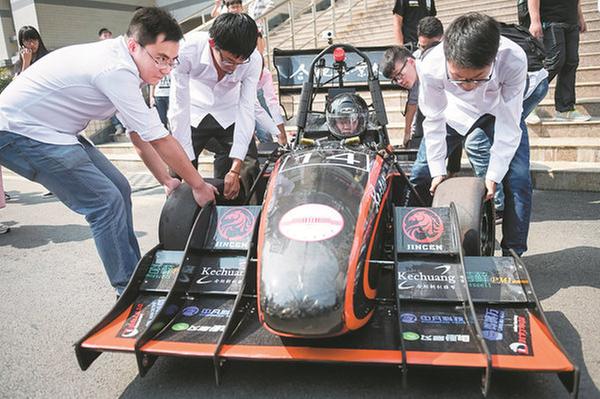Racing makes gradual rise in Chinese sports

 |
| A race car designed and built by students of Hefei University of Technology in Anhui province is put on display in 2016. ZHANG DUAN / XINHUA |
Growing sales of performance street cars are one sign of inroads being made
The Chinese Formula One Grand Prix 2017 this month, a premier racing event, elicited decidedly different reactions among those in the stands in Shanghai.
Zhang Luyang, 35, shivered when Lewis Hamilton from the Mercedes-AMG team, the winner of the race, finished his last lap at the Shanghai International Circuit on the afternoon of April 9.
The shiver came from chilly weather, instead of excitement, after two hours of watching the race on an overcast day. "At long last," Zhang said, standing up and rubbing his hands. "I really could not find any excitement in their running in laps." He said he would not have traveled about 100 km from his home in Suzhou, Jiangsu province, had the 2,760 yuan ($400) ticket not been a gift from a friend.
Zhang's reaction was a sign of the newness of motor sports in China, where fast cars and the piles of money they cost are a relatively recent phenomenon.
Others, however, have caught the fever, and are helping push the sport and the sales of performance cars ever higher, Zhang said.
Wang Fushi, a businessman from Tianjin who has become technical director of DOPE Racing, also attended the race, called himself a "die-hard racing fan".
Wang noted that despite the bad weather, the race attracted almost twice the number of people as qualifying rounds held the day before, indicating that the number of real racing enthusiasts in China is growing.
The three-day event attracted 145,000 spectators, Chinese Grand Prix organizer Juss Event said.
Yet, the development of the sport is uneven, considering the car industry's short history in China: The first domestic production vehicle was rolled out in 1956, and for years, production was small and devoid of racing machines. Many people have little knowledge of car racing or think it's like scenes from Hollywood blockbusters, like the illegal street racing depicted in The Fast and the Furious movie series.
However, things are changing, and racing, not limited to F1, is gaining a growing following in China, said Wang, now a veteran of seven years on the racing circuit.
Wang has participated in a number of different kinds of racing events in the country, such as the Beijing Goldenport Grand Prix, Erdos' Northwestern Stock Car Race in the Inner Mongolia autonomous region, and Zhaoqing's Super Endurance Championship in Guangdong province.
Wang says his passion for racing comes from his technology-related university major and his love affair with speed and automobiles.
"But loving car racing does not necessarily mean I have to ride in a race car," he said. "I'm too old to physically ride in the cars, but it does not stop me from being a race car fan. I love the machinery and I'm always curious about how race cars work and the intricate rules of competition."
While Wang couldn't afford a car when he was younger, he made money in logistics and now has purchased several sports cars, including a vintage race car worth more than 1 million yuan.
As people's living standards are rising, Wang said more businesspeople and white-collar middle-class workers are taking an interest in racing events. Most of them are men.
But he conceded that in China, interest lags behind the West and even other Asian countries.
"Just look at Sepang in Malaysia", said Wang, "their facilities are an order of magnitude better than those of the Shanghai circuit." The Sepang International Circuit is the venue for the Formula One Malaysian Grand Prix.
He said domestic racing teams have little chance to compete with, indeed, even learn from more experienced international rivals.
"Foreign racing teams have to go through complicated and sometimes frustrating procedures to bring their equipment into China, compared with South Korea, Japan or Malaysia, so they do not prefer to race here."
Finances also can be a problem. "Sometime you have to admit money equals speed. If you have 1 million yuan, you can start with Formula Renault, and to participate in the China GT Championship, you will need several millions," said Wang.
Most Popular
- A summer of golden memories
- China's Wang, Sun lead ITTF world rankings
- Three more skiers airlifted off 2026 Olympics slope in Bormio
- Ending 2024 on a high, Napoli returns to top of Serie A
- Osaka won't 'hang around' if the results don't come
- James still king of the court at 40































